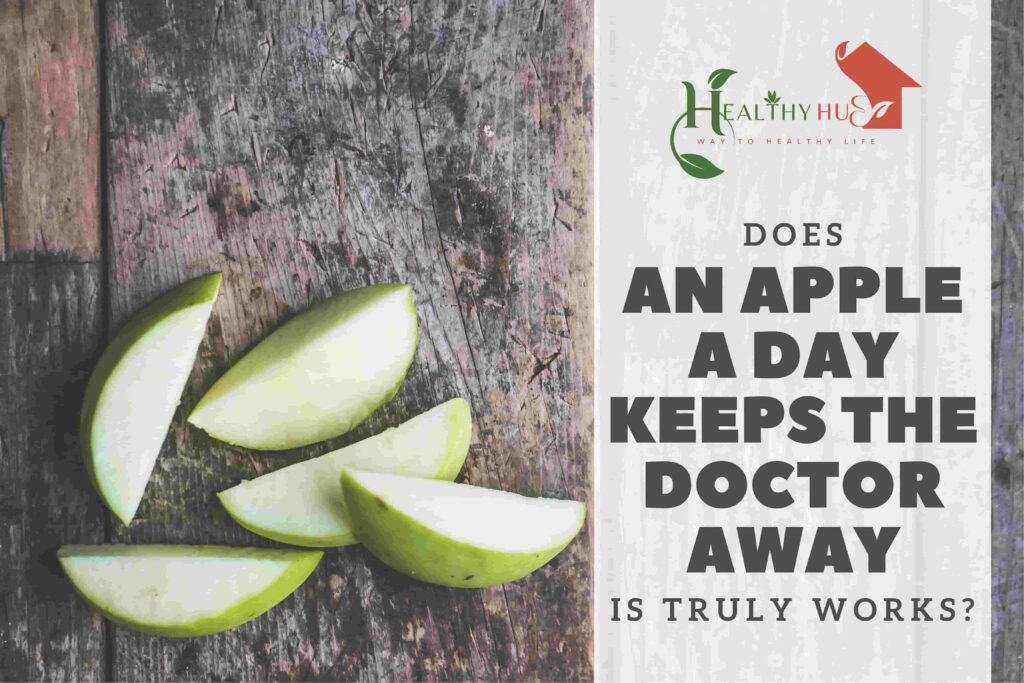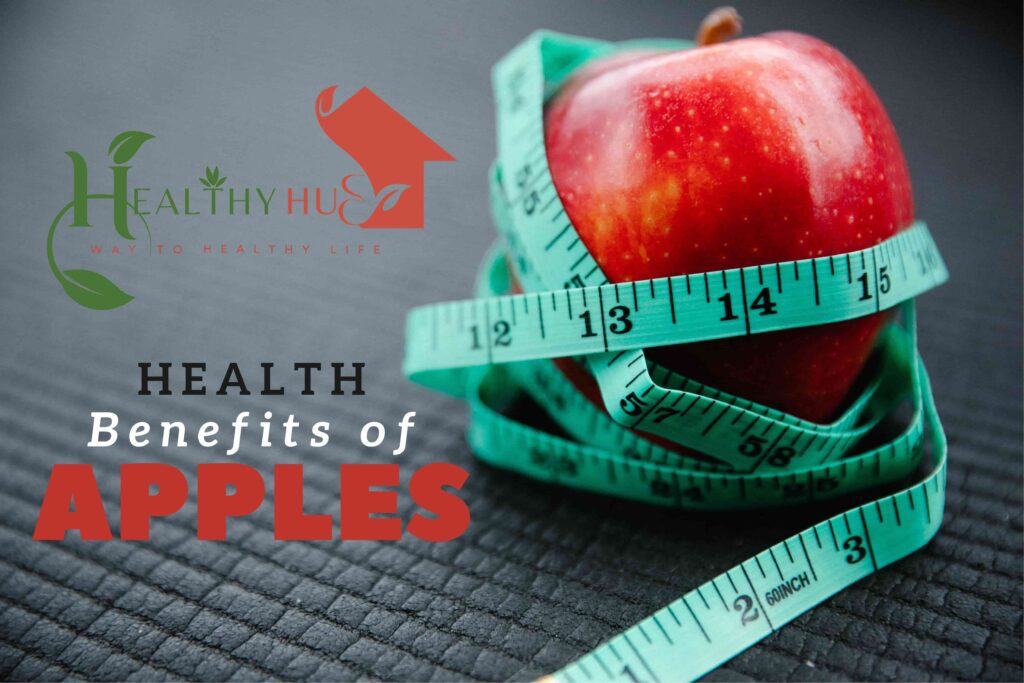“An apple a day keeps the doctor away”
You all have must heard, that “an apple a day keeps the doctor away”. But have you ever wondered WHY? Can a simple piece of fruit really help us maintain good health and avoid frequent visits to the doctor’s office? In this article, we will explore the nutritional value of apples, their potential health benefits, and the scientific evidence behind the claim.
Well, let us tell you that this statement is very much true because apple is full of many beneficial nutrients which not only nourishes your body but also helps to regulate some important body functions which prevents many health problems and obviously we remains Healthy.
Table of Contents
The Origin of the Phrase
The phrase “An apple a day keeps the doctor away” originated in Wales in the 19th century. It was used as a way to emphasize the importance of a healthy diet and the role of apples in promoting well-being. While the phrase itself may not have a scientific basis, it serves as a reminder of the significance of incorporating nutritious foods into our daily lives.
There are many varieties of apples available but juicy, crunchy apples have been celebrated since antiquity for their health benefits. They are high in pectin, a fiber, and slow-release sugars that help to improve heart health and regulate the body’s blood sugar levels. They also contain many important vitamins and minerals, and substances that promote, among other things, strong, healthy bones.

Scientific Studies on Apples and Health
Numerous scientific studies have been conducted to investigate the potential health benefits of apples. While some studies support the claim that apples contribute to overall health, others present differing perspectives. Let’s examine both sides:
Studies Supporting the Claim
Several studies have shown positive associations between apple consumption and various health outcomes. For example, a study published in the British Medical Journal found that individuals who ate apples regularly had a lower risk of developing cardiovascular disease.
Another study published in the American Journal of Clinical Nutrition reported that apple consumption was associated with a reduced risk of lung cancer. These findings suggest that including apples in your diet can have long-term health benefits.
Studies Challenging the Claim
On the other hand, some studies have failed to find significant associations between apple consumption and specific health benefits. For instance, a review published in the Journal of the American Dietetic Association concluded that while apples are nutritious, there isn’t enough evidence to support the claim that they alone can prevent visits to the doctor.
While scientific research provides valuable insights, it’s essential to remember that individual health outcomes may vary based on various factors such as genetics, lifestyle, and overall diet.

Nutritional Value of Apples
Apples are packed with essential vitamins, minerals, and dietary fiber that contribute to our overall health and well-being. They are low in calories, making them an ideal snack for those watching their weight. Here are some key components of apples’ nutritional profile:
Vitamins and Minerals
Apples are a rich source of vitamin C, a powerful antioxidant that helps strengthen the immune system and protect the body against diseases. They also contain vitamins A, E, and various B vitamins, which play crucial roles in maintaining healthy skin, vision, and neurological functions.
Minerals such as potassium, calcium, and magnesium are also found in apples. These minerals are vital for supporting heart health, maintaining bone density, and regulating blood pressure.
Fiber Content
Apples are particularly high in dietary fiber, with both soluble and insoluble forms. Fiber aids in digestion, prevents constipation, and promotes a healthy gut. It also helps regulate blood sugar levels, lower cholesterol, and provide a feeling of fullness, making it beneficial for weight management.
WHAT IS IT GOOD FOR?
Regular consumption of apples can offer a range of health benefits that contribute to overall well-being. Let’s explore some of the important ones are highlighted below:
Blood Sugar Regulation
Apples contains fructose and antioxidant polyphenols which not only improve the metabolic balance but also slow the rate at which sugar is absorbed into the bloodstream thus resulting in low blood sugar levels
Boosting the Immune System
Apples, with their high vitamin C content, help strengthen the immune system, making us more resistant to illnesses and infections. Additionally, the antioxidants present in apples combat free radicals, reducing oxidative stress and promoting cellular health.
Constipation and Diarrhea
Pectin in apples has an amphoteric action, this means that it can provide relief from both constipation and diarrhea, depending on the body’s needs. Apple itself digests quickly in about 80-85 minutes, so the acids and enzymes digesting it quickly helps to digest other foods also.
Reducing the Risk of Chronic Diseases
Studies have shown that the antioxidants and phytochemicals found in apples may help reduce the risk of chronic diseases, including heart disease, certain types of cancer, and neurodegenerative disorders like Alzheimer’s disease. These compounds have anti-inflammatory and anti-cancer properties, contributing to long-term health.
Protecting Bones
The flavonoid namely phlorizin, found in apple skin, may help prevent bone loss associated with menopause, because it fights the inflammation and reduces free-radical production that lead to bone loss.
Promoting Digestive Health
The fiber content in apples aids in maintaining a healthy digestive system. It adds bulk to the stool, preventing constipation, and promoting regular bowel movements. Furthermore, the soluble fiber in apples acts as a prebiotic, nourishing beneficial gut bacteria and supporting a balanced microbiome.
Reduces Cholesterol
Pectin and other constituents, such as antioxidant polyphenols, reduces risk atherosclerosis (hardening of arteries) by reducing the levels of “unhealthy fats” (LDL) and slowing down its oxidation. One of the most important benefit of Polyphenols is to prevent free radicals from damaging heart muscles and blood vessels which contributes to cardiovascular health.
Aiding Weight Loss
Apples can be a valuable addition to a weight loss diet due to their high fiber content and low-calorie density. The fiber keeps you feeling fuller for longer, reducing cravings and overeating. Additionally, the natural sweetness of apples can satisfy cravings for sugary snacks, helping you stay on track with your weight loss goals.

How Do I Get The Best From It? (Health Benefits of Apples)
There are many ways to get the benefits from apple but there are few things to remember
Incorporating Apples into Your Diet
To make the most of the potential health benefits of apples, it’s important to incorporate them into your daily diet. Fresh apples offer the greatest nutritional value, but apple products such as applesauce or apple juice can also be enjoyed. Here are some tips to include apples in your diet:
The Whole Fruit
Every part of apple is edible and we should eat the whole apple (apart from seeds of course) But DON’T FORGET to wash your apples properly before eating as Supermarkets coat apples with wax to give a shine and keep them fresh over long periods.
Fresh Apples vs. Apple Products
Fresh apples provide the most natural form of nutrition. They are a convenient and portable snack that can be enjoyed on its own or combined with other foods like nut butter or cheese. However, apple products such as unsweetened applesauce or dried apple slices can be incorporated into recipes, smoothies, or used as toppings for oatmeal or yogurt.
Go Organic And Local
Try to buy organic fruits, and from sources as local as possible so that you can get the freshest fruit without chemical contamination.
Keep The Skin On
It is recommended to eat your apples with its skin as peeling can remove more than half an apple’s fiber, vitamin C, and iron. Also peeling would require a lot of efforts and time. So just EAT IT!
When opting for apple products, ensure they are minimally processed and free from added sugars or preservatives to maintain their nutritional value.
How Do I Use It?
If you don’t want to eat the apple as it is or just by cutting slices or you are someone who have difficulty in digesting crunchy hard apples then you can try any of the following ways:
A Simple Food For Recuperation
Simply grate 1 apple with its skin and allow to brown slightly to release the juices, making it easier to digest. Take 1–2 large spoonful every hour or as needed.
Baked Apples
Remove the core of large apples, stuff with nuts, dried fruit, chocolates, spices, such as cinnamon, or any of your favorite thing .Then bake at 350°F (180°C) until soft and ENJOY!
Creative Ways to Enjoy Apples
Apples can be enjoyed in various forms, adding flavor and texture to a range of dishes. Consider:
- Slicing apples and adding them to salads for a refreshing crunch.
- Baking apples with cinnamon and a sprinkle of oats for a healthy dessert.
- Making homemade applesauce by cooking apples with a bit of water and a touch of sweetener if desired.
- Blending apples into smoothies for added natural sweetness and fiber.
- The versatility of apples allows for endless possibilities in the kitchen, making it easier to incorporate them into your daily meals and snacks.
Conclusion
While the phrase “An apple a day keeps the doctor away” may not be scientifically proven, there is substantial evidence to support the health benefits of regularly consuming apples. Their rich nutritional profile, high fiber content, and various antioxidants contribute to overall well-being. By incorporating apples into your diet, you can potentially boost your immune system, reduce the risk of chronic diseases, improve digestive health, and aid in weight loss.
So, the next time you reach for a snack, consider grabbing an apple and savouring its natural goodness. Remember, good health begins with simple choices, and incorporating apples into your daily routine can be a step towards a healthier, more vibrant life.
FAQs
Q1: Can eating apples replace the need for medical care?
A1: No, while apples offer nutritional benefits and contribute to overall health, they should not replace the need for proper medical care. Regular check-ups, preventive measures, and medical advice should always be sought when necessary.
Q2: How many apples should I eat in a day?
A2: There is no specific number of apples you should eat in a day. It’s recommended to include a variety of fruits in your diet, including apples. Consuming one or two apples a day as part of a balanced diet can be beneficial.
Q3: Are there any risks associated with eating apples?
A3: Apples are generally safe to consume for most individuals. However, some people may have allergies or sensitivities to apples. If you experience any adverse reactions after eating apples, it’s best to consult a healthcare professional.
Q4: Can apple juice provide the same health benefits as fresh apples?
A4: While apple juice can offer some nutritional value, it’s important to note that it lacks the fiber content present in fresh apples. Additionally, some apple juices may contain added sugars or preservatives. Fresh apples are the optimal choice for maximizing health benefits.
Q5: Can eating apples help with weight loss?
A5: Apples can be a valuable addition to a weight loss diet due to their high fiber content and low-calorie density. The fiber in apples helps you feel fuller for longer, reducing the chances of overeating. However, weight loss is a complex process, and incorporating apples alone may not guarantee results. It’s essential to maintain a balanced diet and engage in regular physical activity for effective weight management.





